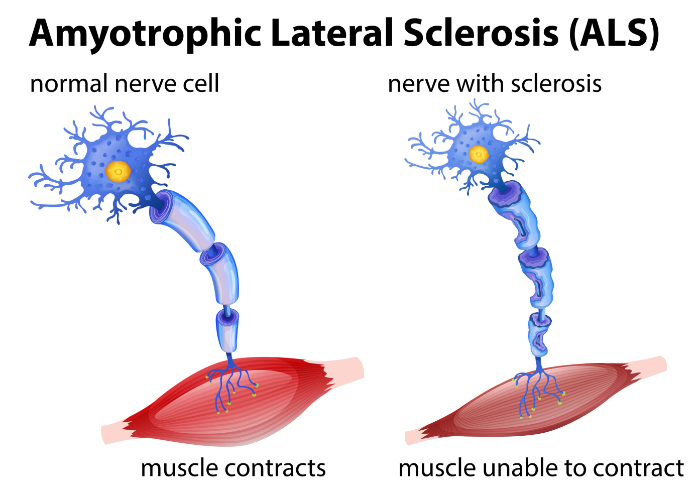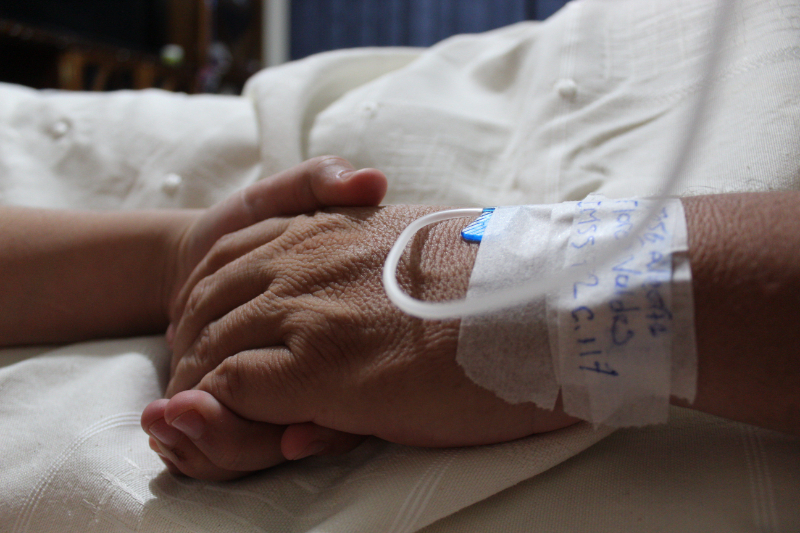Dealing with Amyotrophic Lateral Sclerosis (ALS) can be incredibly challenging, but palliative care offers essential support. This article explores how palliative care can significantly improve the quality of life for ALS patients, focusing on pain relief, emotional support, and maintaining independence despite the disease's progression.
What Is ALS?
Amyotrophic Lateral Sclerosis, frequently known as ALS, is also referred to as Lou Gehrig's disease or motor neurone disease in the United Kingdom. Despite being quite uncommon, this medical condition is progressive and primarily impacts the nervous system; in particular, it targets motor neurons, which are essential nerve cells that regulate all muscle activities.
A key characteristic of ALS is muscle weakness which intensifies over time - this weakness stems from the disease steadily interfering with the motor neurons, leading to a serious disruption in their capacity to relay signals to the muscles. This disruption means that muscles no longer receive the signals they need to function, causing a gradual loss of muscle functionality over time.
As the disease advances, it can induce more severe complications, such as paralysis, brought about by muscle atrophy. This condition arises when muscles become so weak that they can no longer function; this paralysis can drastically impact a person's quality of life and daily activities. One of the hardest aspects of ALS is the lack of a known cure.
Why Do People With ALS Benefit From Palliative Care?
People who are diagnosed with Amyotrophic Lateral Sclerosis (ALS) typically experience significant physical challenges. These can include breathing difficulties, trouble swallowing, muscle pain, muscle tissue deterioration, and struggles with clear speech.
Palliative care offers a vital support network that helps ALS patients to manage these difficulties; thereby improving their quality of life. This empathetic form of care concentrates on relieving pain in addition to other incapacitating symptoms. This approach helps patients maintain their autonomy and allows them to stay actively involved in making well-informed decisions about their continual care and treatment.
.jpg)
Moreover, palliative care tackles not just the physical issues but also addresses the emotional, social and psychological challenges that emerge through the development of ALS symptoms. This comprehensive approach ensures that patients are supported in every aspect of their life from dusk to dawn.
Palliative care is a crucial part of the treatment plan for individuals suffering from ALS, focusing on enhancing life quality and offering comfort rather than looking for a cure for the disease. The ultimate goal of palliative care is to enable patients to live their lives to the fullest, despite the limitations imposed by ALS.
Benefits Of Palliative And Hospice Care For ALS
Palliative care is significant in boosting the well-being of individuals living with Amyotrophic Lateral Sclerosis (ALS), a serious and progressive condition. This type of specialist care is centred around easing the symptoms and reducing the resulting stress of the illness; thereby enhancing the patient's everyday life. Palliative care supplies medical staff with the knowledge and skills to effectively handle acute ALS symptoms such as severe pain and difficult breathing - this ultimately provides patients with a greater level of comfort.
As ALS advances, curative treatments are less successful, and this is when hospice care services become crucial. These services focus on delivering end-of-life care that puts the comfort, respect, and dignity of the patients at the forefront.
Hospice care uses a wide-ranging method, looking at not just the physical discomfort, but also the emotional and psychological needs of patients - this all-encompassing approach to patient well-being helps in managing the overall symptoms and allows individuals to go through their final stages with ease and dignity. To conclude, both palliative and hospice care bring a range of advantages for those suffering from ALS.
They facilitate the journey, offering comfort and promoting a quality of life that every patient is entitled to; these facilities are particularly beneficial in the advanced stages of ALS, where other treatments may no longer be effective.

ALS Tests And Palliative Therapies
Amyotrophic Lateral Sclerosis (ALS) is a neurodegenerative disease that's diagnosed through an extensive process that uses various medical tests. These tests, although they can't provide a cure for ALS, play a pivotal role in confirming a diagnosis and discounting the potential for other neurological diseases.
The aim of these tests is not only to diagnose ALS but also to provide a basis for compiling a palliative treatment strategy; this treatment strategy is pivotal for managing ALS and reducing its symptoms - providing relief to those living with the disease.
An amalgamation of palliative therapies is commonly used to manage the symptoms of ALS as well as to ease the disease's progression. Alongside these therapies, medications designed to reduce pain and hinder the disease's advance are also prescribed.
Furthermore, physical therapies are also crucial to maintaining muscle functionality as the disease progresses, providing patients with an improved level of mobility and independence. Another aspect of palliative care for people with ALS involves respiratory support - breathing devices and aids are frequently used to relieve the respiratory difficulties that ALS often brings.
These diverse palliative therapies are customised to meet the patient's unique needs; the main goal is to enhance their quality of life during this period, providing comfort, and support and easing symptoms wherever possible.
How Does ALS Affect A Person’s Daily Life?
Amyotrophic Lateral Sclerosis (ALS) can drastically redefine an individual's daily life, severely limiting their abilities to perform routine activities and reducing their independence. Individuals grappling with ALS struggle with tasks such as swallowing, speaking, breathing and moving due to the continued weakening and eventual deterioration of their muscles.
In addition to being an immense physical barrier, ALS also has a significant impact on a person's emotional and psychological well-being.

People dealing with ALS can face feelings of anxiety and depression, brought on by the constant progression of the disease and the impending prospect of losing their autonomy. The projected future of ALS, its cognitive impacts, physical deterioration, and the looming loss of control can create an extremely taxing emotional situation for both the individual and their loved ones.
Facing a diagnosis of ALS, and the rapidly evolving nature of the disease can pose a range of challenges. Services such as palliative care and hospices can be indispensable for ALS as they provide psychological and emotional support. These services strive to improve the quality of life of those wrestling with the daily realities and hardships of dealing with ALS.
Early signs of ALS can include symptoms like weakness in limbs, difficulty in speech or swallowing, and muscle spasms or twitching. However, as the disease advances and affects more muscles, these challenges grow into significant issues, making tasks like moving or swallowing more difficult.
In severe cases, if the disease affects the muscles responsible for respiration, it can suddenly turn the simple act of breathing into a strenuous task. While dealing with the effects of ALS is unquestionably daunting, palliative treatments and therapies can offer some relief, helping to slow down the progression of symptoms.
Our compassionate specialist caregivers provide palliative care in the comfort of your home. Companions Home Care offers personalised assistance and support for your loved ones with diverse care requirements. Get in touch with us today to explore our palliative home care services available in London.

